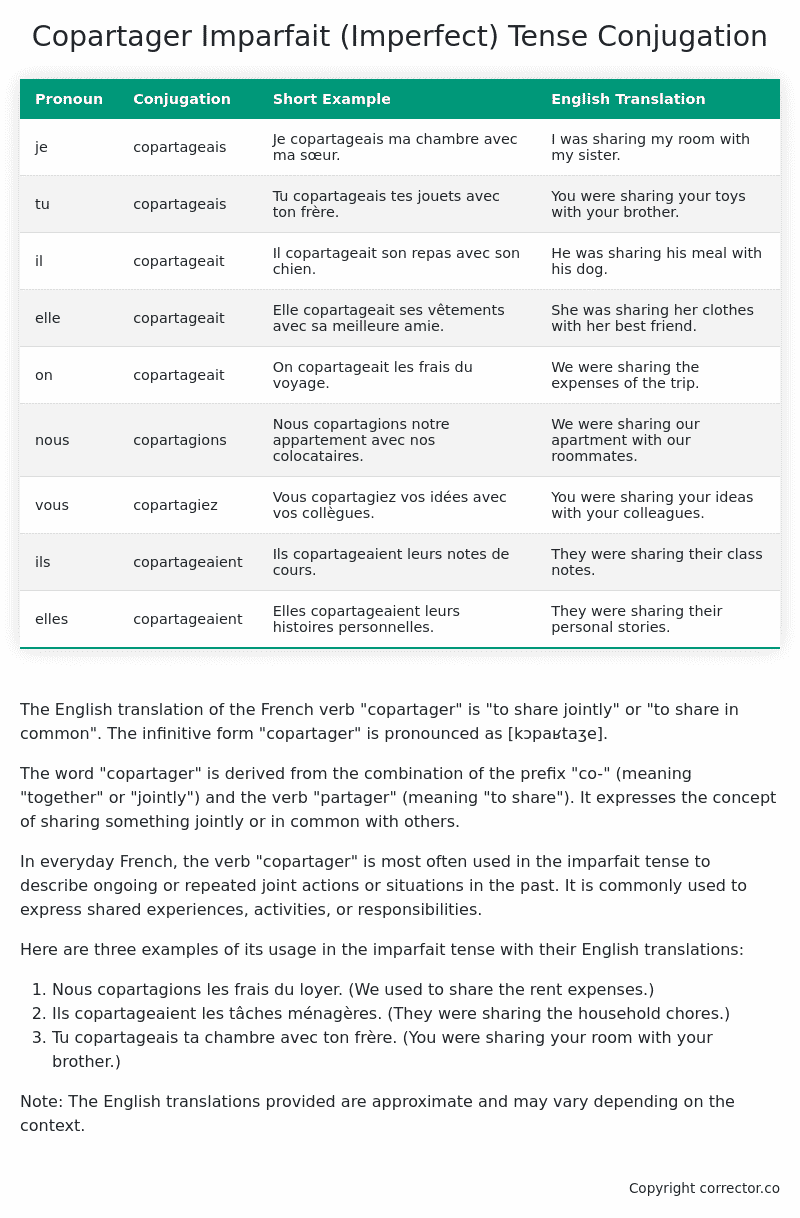Imparfait (Imperfect) Tense Conjugation of the French Verb copartager
Introduction to the verb copartager
The English translation of the French verb “copartager” is “to share jointly” or “to share in common”. The infinitive form “copartager” is pronounced as [kɔpaʁtaʒe].
The word “copartager” is derived from the combination of the prefix “co-” (meaning “together” or “jointly”) and the verb “partager” (meaning “to share”). It expresses the concept of sharing something jointly or in common with others.
In everyday French, the verb “copartager” is most often used in the imparfait tense to describe ongoing or repeated joint actions or situations in the past. It is commonly used to express shared experiences, activities, or responsibilities.
Here are three examples of its usage in the imparfait tense with their English translations:
- Nous copartagions les frais du loyer. (We used to share the rent expenses.)
- Ils copartageaient les tâches ménagères. (They were sharing the household chores.)
- Tu copartageais ta chambre avec ton frère. (You were sharing your room with your brother.)
Note: The English translations provided are approximate and may vary depending on the context.
Table of the Imparfait (Imperfect) Tense Conjugation of copartager
| Pronoun | Conjugation | Short Example | English Translation |
|---|---|---|---|
| je | copartageais | Je copartageais ma chambre avec ma sœur. | I was sharing my room with my sister. |
| tu | copartageais | Tu copartageais tes jouets avec ton frère. | You were sharing your toys with your brother. |
| il | copartageait | Il copartageait son repas avec son chien. | He was sharing his meal with his dog. |
| elle | copartageait | Elle copartageait ses vêtements avec sa meilleure amie. | She was sharing her clothes with her best friend. |
| on | copartageait | On copartageait les frais du voyage. | We were sharing the expenses of the trip. |
| nous | copartagions | Nous copartagions notre appartement avec nos colocataires. | We were sharing our apartment with our roommates. |
| vous | copartagiez | Vous copartagiez vos idées avec vos collègues. | You were sharing your ideas with your colleagues. |
| ils | copartageaient | Ils copartageaient leurs notes de cours. | They were sharing their class notes. |
| elles | copartageaient | Elles copartageaient leurs histoires personnelles. | They were sharing their personal stories. |
Other Conjugations for Copartager.
Le Present (Present Tense) Conjugation of the French Verb copartager
Imparfait (Imperfect) Tense Conjugation of the French Verb copartager (You’re reading it right now!)
Passé Simple (Simple Past) Tense Conjugation of the French Verb copartager
Passé Composé (Present Perfect) Tense Conjugation of the French Verb copartager
Futur Simple (Simple Future) Tense Conjugation of the French Verb copartager
Futur Proche (Near Future) Tense Conjugation of the French Verb copartager
Plus-que-parfait (Pluperfect) Tense Conjugation of the French Verb copartager
Passé Antérieur (Past Anterior) Tense Conjugation of the French Verb copartager
Futur Antérieur (Future Anterior) Tense Conjugation of the French Verb copartager
Subjonctif Présent (Subjunctive Present) Tense Conjugation of the French Verb copartager
Subjonctif Passé (Subjunctive Past) Tense Conjugation of the French Verb copartager
Subjonctif Imparfait (Subjunctive Imperfect) Tense Conjugation of the French Verb copartager
Subjonctif Plus-que-parfait (Subjunctive Pluperfect) Tense Conjugation of the French Verb copartager
Conditionnel Présent (Conditional Present) Tense Conjugation of the French Verb copartager
Conditionnel Passé (Conditional Past) Tense Conjugation of the French Verb copartager
Conditionnel Passé II (Conditional Past II) Tense Conjugation of the French Verb copartager
L’impératif Présent (Imperative Present) Tense Conjugation of the French Verb copartager
L’impératif Passé (Imperative Past) Tense Conjugation of the French Verb copartager
L’infinitif Présent (Infinitive Present) Tense Conjugation of the French Verb copartager
L’infinitif Passé (Infinitive Past) Tense Conjugation of the French Verb copartager
Le Participe Présent (Present Participle) Tense Conjugation of the French Verb copartager
Le Participe Passé (Past Participle) Tense Conjugation of the French Verb copartager
Struggling with French verbs or the language in general? Why not use our free French Grammar Checker – no registration required!
Get a FREE Download Study Sheet of this Conjugation 🔥
Simply right click the image below, click “save image” and get your free reference for the copartager imparfait tense conjugation!

Copartager – About the French Imparfait Tense
NOTE: To take a deep dive into all the French tenses then see our article on Mastering French Tense Conjugation.
Formation of the Imparfait Tense
For regular -er verbs:
For regular -ir verbs
For regular -re verbs
Common Everyday Usage Patterns
Description of Past Habits
Background Information
Mental and Emotional States
It’s employed to express emotions, thoughts, or physical sensations in the past. For example: “J’étais content quand il est arrivé.” (I was happy when he arrived.)
Ongoing Actions
Points to Note About the Imparfait Tense
Passé Composé vs. Imparfait
Conditional
Si Clauses
Narration
I hope you enjoyed this article on the verb copartager. Still in a learning mood? Check out another TOTALLY random French verb imparfait conjugation!


